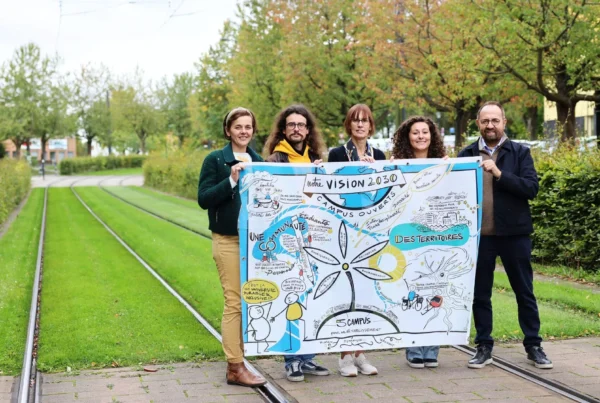The potential of microsensors and digitisation for the technological transformation of Lusatia, a region in between Germany and Poland
The second project phase of the Innovation Campus Electronics and Microsensors – iCampµs Cottbus was launched on 15h June, 2022, aimed at enhancing a technological transformation in Lusatia, a region located between Germany and Poland. The iCampµs, which is fosuced on the develompents in Smart health, Environmental Sensor technology 4.0 and Industry 4.0, is a research cooperation between the Brandenburg University of Technology (BTU-Germany) and four other German partners (Ferdinand-Braun-Institute Leibniz-Institute for High Frequency Technology -FBH-, Fraunhofer Institute for Reliability and Microintegration -IZM-, Fraunhofer Institute for Photonic Microsystems -IPMS- and Leibniz Institute for High Performance Microelectronics -IHP-).
Application fields of microsensors and digitalisation are wide-ranging and it is impossible to imagine our time and our society without them. With their differentiated properties, microsensors permit very diverse, individual and precisely tailored approaches to solutions. This makes microsensor technology a technology of the future that offers enormous potential for the sustainable shaping of our society and, in particular, of the Lusatian region after the phase-out of lignite.
This second phase of the iCampµs research cooperation received a 20-million-euro funding from the German Federal Ministry of Education and Research for a period of five years.
Brandenburg University of Technologt (BTU) President Prof. Gesine Grande emphasised: “The iCampµs combines the expertise of the university and five non-university research institutions and uses the innovative solutions to position SMEs well for the digital future. Together, we are creating an innovative and pioneering centre for microsensors and digitalisation at the Cottbus campus, which not only stands for excellent research, but also offers an important perspective for skilled workers and for the development of economic power in the region. The iCampµs strengthens our profile line Artificial Intelligence and Sensor Technology and transdisciplinary networking.”
Prof. Harald Schenk, project leader and head of the Department of Micro and Nano Systems and the Fraunhofer -IPMS- (iCampµs partner), concretises: “At the BTU Cottbus-Senftenberg, a regional focal point with national appeal in the fields of electronics and microsensorics was already created in the first project phase. Now we will significantly expand our range of application-specific solutions to enable sustainable innovations for our partners and all future interested parties.”
Federal Research Minister Bettina Stark-Watzinger highlighted the importance of the project: “We in Germany and the European Union must ourselves be in a position to understand, develop and produce key technologies. This reduces dependencies and creates valuable jobs in our country. That’s why the German Federal Ministry of Education and Research is providing a total of around 4.4 billion euros for research projects as part of the structural change programme. Our focus here is on transfer. This is also the case with the successful project Innovation Campus Electronics and Microsensorics Cottbus. The iCampus2 is growing exactly what our funding is aimed at: a strong ecosystem for innovation. This opens up new prospects for the future for local people and companies.”
Dr. Manja Schüle, Brandenburg’s Minister of Science, added: “The iCampµs has a pioneering role: it was the first project in the state of Brandenburg to receive funding from the German government’s emergency programme for structural change in coal regions. What is special about the project is that it deals with microelectronic and nanoelectronic sensors and systems – key technologies for the future. And the iCampµs links the university, research laboratories and SMEs from the region. And it does so transnationally -between Berlin, Brandenburg and Saxony- and across the boundaries of scientific organisations. The interest of SMEs in cooperating with iCampµs is huge. This shows that the potential is there! This is what successful structural change ‘Made by future’ looks like.”
Background
In the two-year first phase of the iCampµs project (November 2019 – December 2021), the focus was on identifying innovation potential, transferring knowledge to industry, and accelerating the transition from research and development to the product, including prototyping. The second phase (January 2022 – December 2026) builds on the research results achieved, in which the results are further developed for commercial exploitation in cooperation with companies from Lusatia. The project scope amounts to a total of nine technical work packages with 12 sub-projects.
Germany’s political decision to phase out lignite-based energy production means the fundamental transformation of an entire region for the Lausitz region. At the same time, sustainable structures have to be created to increase the innovation and competitiveness of the economy and the labor market in Lusatia. The “Innovation Campus Electronics and Microsensorics Cottbus – iCampμs” was selected as part of the German government’s immediate action program to support these political and economic goals. Overarching goals of the project range from a local bundling of competencies in the field of microsensorics to the implementation of R&D work with high transfer and spin-off potential.
Picture: (c) Fraunhofer Institute of Photonic (IPMS)





